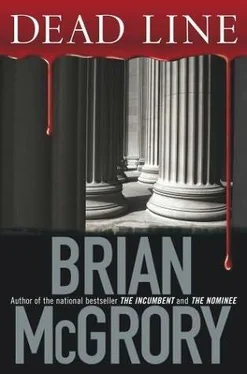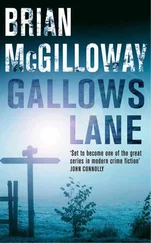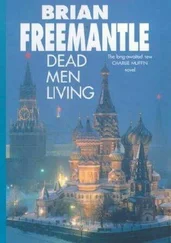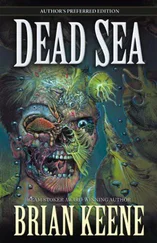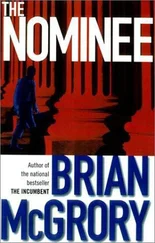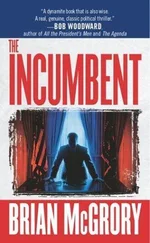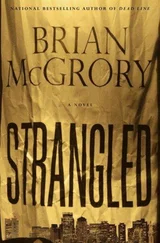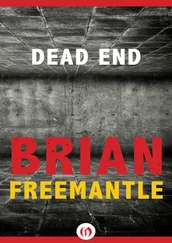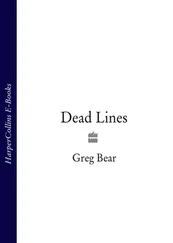Brian Mcgrory - Dead Line
Здесь есть возможность читать онлайн «Brian Mcgrory - Dead Line» весь текст электронной книги совершенно бесплатно (целиком полную версию без сокращений). В некоторых случаях можно слушать аудио, скачать через торрент в формате fb2 и присутствует краткое содержание. ISBN: , Жанр: Политический детектив, на английском языке. Описание произведения, (предисловие) а так же отзывы посетителей доступны на портале библиотеки ЛибКат.
- Название:Dead Line
- Автор:
- Жанр:
- Год:неизвестен
- ISBN:0-7434-8034-1
- Рейтинг книги:3 / 5. Голосов: 1
-
Избранное:Добавить в избранное
- Отзывы:
-
Ваша оценка:
- 60
- 1
- 2
- 3
- 4
- 5
Dead Line: краткое содержание, описание и аннотация
Предлагаем к чтению аннотацию, описание, краткое содержание или предисловие (зависит от того, что написал сам автор книги «Dead Line»). Если вы не нашли необходимую информацию о книге — напишите в комментариях, мы постараемся отыскать её.
Dead Line — читать онлайн бесплатно полную книгу (весь текст) целиком
Ниже представлен текст книги, разбитый по страницам. Система сохранения места последней прочитанной страницы, позволяет с удобством читать онлайн бесплатно книгу «Dead Line», без необходимости каждый раз заново искать на чём Вы остановились. Поставьте закладку, и сможете в любой момент перейти на страницу, на которой закончили чтение.
Интервал:
Закладка:
I stood up and said to Martin, “What do you know about the dead woman on the Common?”
Most editors in chief are big-picture people, probably because it’s easier to be that way, just like it’s easier to travel great distances by air than to drive in a car, though high above, you miss all the individual brushstrokes that go into the art of real life. Martin was decidedly different. To be sure, he could think big and ponder the most serious questions in the business, but he also had an insatiable curiosity for the details of even the smallest house fire in Dorchester.
As if to prove the point, he said, “First reports out say she was a young attorney, maybe thirty years old, found in her car in the garage under Boston Common by an attendant picking up the trash. Single gunshot wound to the head.”
What the hell was the deal with parking garages lately?
“Suicide?” I mean, logical question, given that all the lawyers I knew were always saying they wanted to kill themselves.
“If it was,” he replied, “then she managed to hide the gun.”
B ack at my desk, I snatched up the telephone, and pulled out the phone number for Tom Jankle, special agent of the FBI. My hope, my expectation, was that if he spoon-fed me the prior night when he only knew me by reputation, then now that we had a track record, he should be ready to spew any remaining information he had. No telling how much chicken I left on that journalistic bone, but my educated hunch was, a lot. A lot.
A rather imperious-sounding woman informed me, “Special Agent Jankle is not available right now. May I help you?”
A couple of points here. First, why don’t newspaper people have the word “Special” in our titles? Actually, why don’t we have titles at all? Why can’t I say to someone over the phone, “Hello, this is Special Reporter Flynn calling from The Boston Record blah blah blah.” Actually, here’s why: Because we’d sound like asses, which is exactly how this secretary sounded now.
Point two: I hate when self-important secretaries and other assorted assistants ask, “May I help you?” as if my call, my concerns, must be so profoundly trivial that I couldn’t possibly warrant the attention of their boss. Let me ask you something: Are you a party to the investigation? Are you prepared to be quoted in front of a million people in tomorrow’s Record, or to leak sensitive information that will push the story along? If not, then just take a message.
Actually, I didn’t say any of that. More politely, but not too much so, I said, “You could take a message.”
“Is there someone else who could help you?” Okay, now this was getting rich. The night before, her boss sends a team of trained apes to pull me out of a ball game at Fenway Park. They chauffeur me to his office. He sits with me in private as the clock ticks toward midnight and provides me hitherto unknown details on the largest unsolved art heist in the history of the nation. He’s in essence, actually, looking for my help. And she’s thinking I don’t warrant his attention, because this great man must absolutely be far too important to deal with anything or anyone so trivial as the largest, most respected, and most important newspaper in New England.
“I don’t think so,” I replied, my voice still surprisingly soft, even upbeat. “If you could just tell him—”
“His schedule is very full today.”
“So’s mine.” Not quite as nice. “But if you could ask him to call Jack Flynn”—I gave her my number before she cut me off again—” I’ll absolutely take the time to talk to him.” I thanked her, almost overly pleasantly so, and quickly hung up, another border skirmish in the war on government imperialism successfully fought.
Then I proceeded to pound out another two dozen calls to various state, city and law enforcement officials who I knew or should have known or wanted to know, all in what the unkind might call a fishing expedition, but I’d prefer to describe as an informational dragnet. On a story of this caliber and magnitude, you leave no number undialed, no office unchecked. Hell, the truth is, most of the bureaucrats I was ringing up would take it as a compliment that I was even calling. Of course, all I got was equally officious secretaries and occasional voicemails, but the return calls would come soon enough.
All along, something still wasn’t right. Intuition, while a gift, was not always a blessing. The pang in my stomach was slowly turning into a knot, and someone seemed to be tying it tighter, pulling on the strings, giving me a sickening feeling that penetrated my flesh and rattled my bones. I turned fully around and gazed out the far windows of the newsroom to see that traffic was still at a standstill. I absently flicked the On button on the portable television that sat on a corner of my desk.
As the screen came to life, I saw a familiar reporter standing in front of the Gardner Museum, a microphone held up to his uncommonly handsome face. “Behind me,” he was saying, “is one of the world’s great art museums, but most famous not for its paintings, but for being the target of the country’s costliest heist.” From there, it kicked over to a prerecorded segment that basically reiterated the guts of my morning story, with full attribution. I turned the volume down and made a few more calls.
Somewhere along the line, I noticed that the television image flipped from the Gardner footage to an open grassy space set against the backdrop of the Boston skyline. I quickly turned the volume up to hear a rather comely redheaded reporter saying, “Ham, police are saying that she was found at about 7:15 this morning slumped over the steering wheel of her Saab with a single gunshot wound to the left side of her head. The car doors were all closed, the doors locked, the windows unbroken. No gun was found inside. The twenty-seven-year-old victim was found on the second level of the garage. Her identity has not yet been released pending notification of her relatives.”
The knot was starting to feel like a damned tumor. I bore in harder on the reporter. Behind her, detectives in suits came and went from a headhouse into the garage.
Ham, as anchors are wont to do, asked a stupid question. “Kelly, any suspects yet that we know of?”
Kelly shot him a look that melded disbelief and disdain. Then, composed, she replied, “Ham, the police are being unusually mum on this case. It has all the makings of becoming a very high-profile murder investigation, and they haven’t tipped their hand to us as of yet. There is, however, a briefing scheduled for police headquarters later this morning, and hopefully I’ll have more information to pass along after that.”
It wasn’t Kelly’s rather colorless answer that sounded alarms, but what occurred at the crime scene as she gave it. Behind her, an enormous man in a dark windbreaker quickly walked out the glass doors of the headhouse, his mustache twitching with each step. He was in the frame for maybe two seconds, tops, but the sight sent a lightning bolt of recognition into my fragile brain.
Tom Jankle, special agent with the FBI, hanging around a local murder scene. It made not an ounce of sense. FBI agents don’t investigate homicides, at least not run-of-the-mill ones, though I suppose none of them appear run-of-the-mill to the victims. They don’t work with local police departments, at least not very well. They don’t usually even offer their help. Cops and G-men are usually like cowboys and Indians.
Was it really him? I only caught the quickest of glimpses. I pondered that exact question as Kelly in the field answered yet another profoundly inane question from Ham on the anchor desk, and there, in the background, was Tom Jankle, once again hurrying back into the same glass doors in the near distance that he had just exited, his head down and a cellular telephone planted against his ear.
Читать дальшеИнтервал:
Закладка:
Похожие книги на «Dead Line»
Представляем Вашему вниманию похожие книги на «Dead Line» списком для выбора. Мы отобрали схожую по названию и смыслу литературу в надежде предоставить читателям больше вариантов отыскать новые, интересные, ещё непрочитанные произведения.
Обсуждение, отзывы о книге «Dead Line» и просто собственные мнения читателей. Оставьте ваши комментарии, напишите, что Вы думаете о произведении, его смысле или главных героях. Укажите что конкретно понравилось, а что нет, и почему Вы так считаете.
